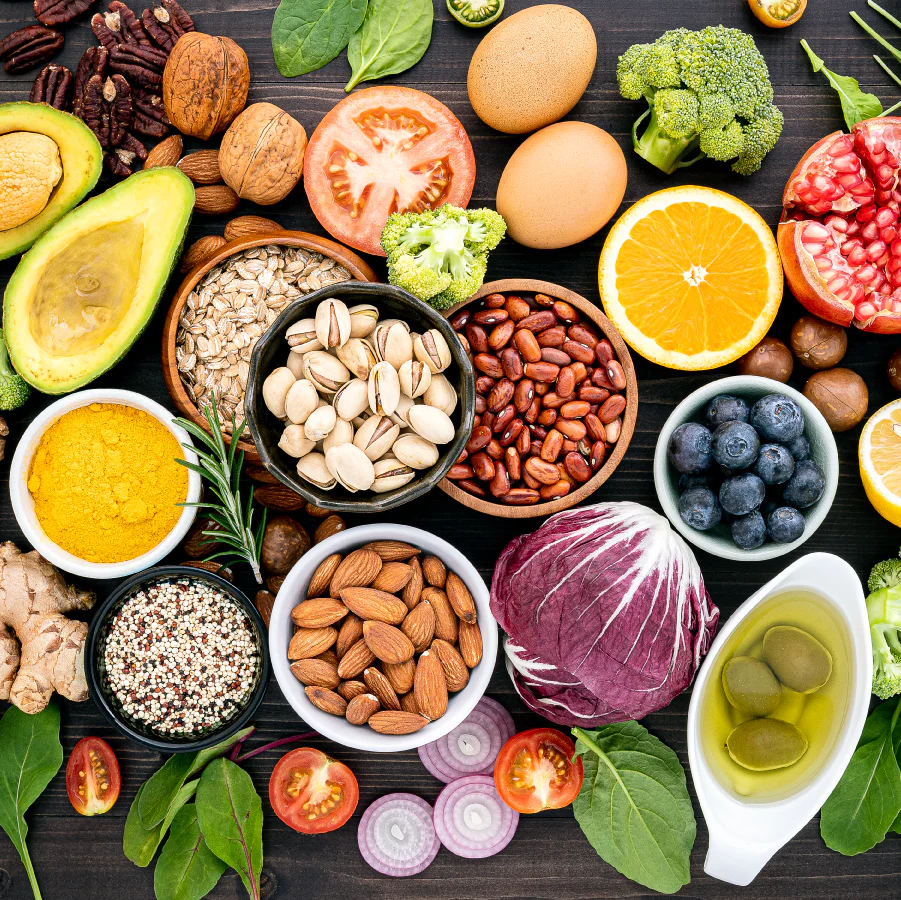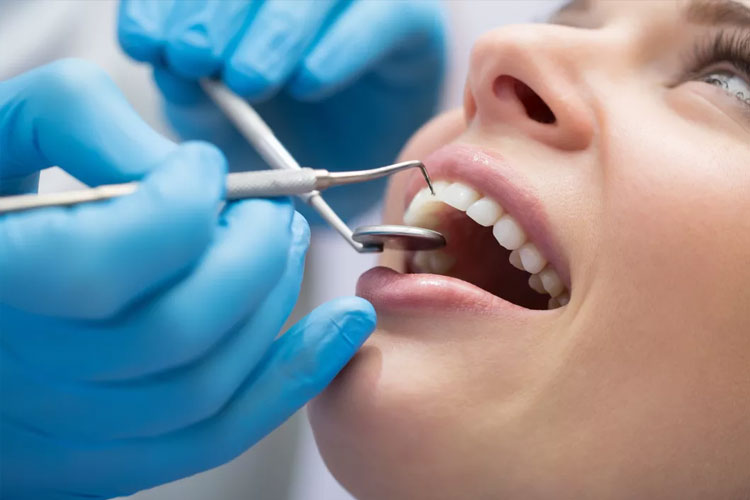Vitamin E is a powerful antioxidant that offers numerous health benefits. Here are 10 benefits of vitamin E along with some common nutritional sources.
Antioxidant properties:
Vitamin E is a potent antioxidant that helps protect cells from damage caused by free radicals, which are unstable molecules that can harm cells and contribute to aging and chronic diseases.
Antioxidants are compounds that protect the body from free radicals, which are unstable molecules that can cause damage to cells and lead to various diseases. Vitamin E is a potent antioxidant that helps in preventing cell damage and boosts the immune system. It neutralizes free radicals and prevents them from causing oxidative stress in the body.
Vitamin E also has anti-inflammatory properties, which help reduce inflammation in the body. Chronic inflammation is linked with several chronic diseases like heart disease, cancer, and diabetes. Consuming foods rich in vitamin E can therefore have significant health benefits.
Some of the best sources of vitamin E include nuts like almonds, hazelnuts, pistachios, sunflower seeds, avocadoes, spinach and broccoli among others. Including these foods as part of a balanced diet can go a long way in promoting overall health by providing essential nutrients such as antioxidants like vitamin E for optimal bodily functions.
Also Read: wellhealthorganic.com:amazing-beauty-tips-of-ice-cube-will-make-you-beautiful-and-young
Heart health:
Vitamin E has been linked to a reduced risk of heart disease. It helps prevent the oxidation of LDL (low-density lipoprotein) cholesterol, also known as “bad” cholesterol, which can lead to plaque formation in arteries.
Vitamin E is an essential nutrient that plays a significant role in maintaining heart health. It acts as an antioxidant and helps to prevent the buildup of plaque in arteries, which can lead to blockages and increase the risk of heart disease. Vitamin E also helps to improve blood flow, reduce inflammation, and prevent blood clot formation.
Some of the best dietary sources of vitamin E include nuts such as almonds, hazelnuts, and peanuts, as well as seeds like sunflower seeds and pumpkin seeds. Other excellent sources include leafy green vegetables like spinach and broccoli, whole grains like wheat germ and brown rice, vegetable oils such as olive oil and sunflower oil, and fortified cereals.
In addition to consuming vitamin E-rich foods in your diet, taking supplements may also be beneficial for heart health. However, it’s important to consult with a healthcare professional before starting any new supplement regimen. Overall, incorporating vitamin E into your diet can help support a healthy heart and reduce the risk of cardiovascular disease.
Skin health:
Vitamin E is often used in skincare products due to its moisturizing and healing properties. It helps nourish the skin, reduce inflammation, and protect against UV-induced damage.
Vitamin E is a crucial nutrient that plays a vital role in maintaining skin health. This powerful antioxidant helps to protect the skin from damage caused by free radicals, which are unstable molecules that can harm cells and cause premature aging. Vitamin E also promotes collagen production, which is essential for healthy skin since it keeps the skin firm and supple.
In addition to its antioxidant properties, vitamin E has anti-inflammatory effects that can help reduce the redness and irritation associated with certain skin conditions like eczema and psoriasis. Furthermore, vitamin E can improve blood circulation in the body, increasing oxygen supply to cells and tissues, including your skin.
To ensure you’re getting enough vitamin E in your diet, include foods like almonds, sunflower seeds, spinach, avocados, and sweet potatoes. Alternatively, you may take supplements containing vitamin E but be sure to consult with your healthcare provider before starting any new supplement regimen. Ultimately consuming adequate amounts of vitamin E through food or supplements can help maintain healthy-looking skin by improving its overall function and protection against environmental stressors.
Also Read: wellhealthorganic.com:weight-loss-in-monsoon-these-5-monsoon-fruits-can-help-you-lose-weight
Immune function:
Vitamin E plays a role in supporting the immune system, helping to strengthen the body’s defense against infections and diseases.
Vitamin E is a powerful antioxidant that plays an important role in maintaining immune function. It helps to protect the body against harmful free radicals that can damage cells and tissues. This nutrient also supports the production of white blood cells, which are responsible for fighting off infections and diseases.
In addition to its immune-boosting properties, vitamin E has been linked to a number of other health benefits. It may help to lower the risk of heart disease by reducing inflammation and preventing the formation of blood clots. This nutrient has also been shown to support skin health by protecting against UV damage and promoting collagen production.
To ensure that you are getting enough vitamin E in your diet, it is important to consume a variety of foods rich in this nutrient. Good sources include nuts, seeds, leafy greens, whole grains, and fortified cereals. You can also consider taking a supplement if you are not able to meet your daily needs through food alone.
Eye health:
Vitamin E has been associated with a reduced risk of age-related macular degeneration (AMD), a leading cause of vision loss in older adults.
One of the most important aspects of eye health is maintaining a healthy diet that includes foods rich in important vitamins and nutrients. Vitamin E, for example, is crucial for maintaining good eye health. Not only does it help protect the eyes from damage caused by free radicals, but it also helps reduce the risk of cataracts and age-related macular degeneration. Nutritional sources of vitamin E include almonds, sunflower seeds, spinach, avocadoes, and sweet potatoes.
In addition to eating a balanced diet with plenty of vitamin-rich foods, it’s also important to take steps to protect your eyes from harmful UV rays. Wearing sunglasses when outdoors can help prevent damage to the eyes caused by excessive exposure to sunlight. It’s also recommended that you get regular eye exams with an optometrist or ophthalmologist to catch any potential issues early on and ensure that your eyes stay healthy over time.
Overall, focusing on proper nutrition and protection from harmful environmental factors are key components in ensuring optimal eye health throughout your life span.
Also Read: Wellhealthorganic.com:facial-fitness-anti-aging-facial-exercises-to-look-younger-every-day
Cognitive health:
Vitamin E may have a protective effect on brain health and may help slow down cognitive decline in older adults.
Cognitive health is the ability of our brain to perform various mental processes, including learning, thinking, reasoning, and memorizing. Maintaining good cognitive health is essential for leading a healthy and productive life. Vitamin E has been found to play a crucial role in supporting cognitive function. It is an antioxidant that protects our brain cells from oxidative stress caused by free radicals.
Studies have shown that vitamin E can improve memory and slow down the progression of cognitive decline in older adults. It also helps in reducing inflammation and promoting better blood flow to the brain. Some of the best dietary sources of vitamin E include nuts (such as almonds, peanuts, and hazelnuts), seeds (such as sunflower seeds), vegetable oils (such as olive oil and sunflower oil), spinach, broccoli, and avocado.
In addition to including vitamin E-rich foods in your diet, it is also important to adopt other lifestyle habits that support cognitive health. This includes getting enough sleep each night, engaging in regular physical activity such as walking or yoga, practicing mindfulness meditation or relaxation techniques like deep breathing exercises or progressive muscle relaxation techniques for stress relief- all of which contribute towards maintaining good cognitive health over time.
Muscle health:
Vitamin E has been shown to help improve muscle strength and reduce muscle damage, making it beneficial for athletes and those with muscle-related conditions.
Muscle health is an essential aspect of maintaining a healthy body. Adequate nutrition plays a crucial role in supporting muscle function and growth, and vitamin E is one of the vital nutrients for maintaining optimal muscle health. Vitamin E is a potent antioxidant that helps protect cells against oxidative damage caused by free radicals.
Several studies have shown that vitamin E can enhance muscle strength and reduce muscles’ susceptibility to injury. Vitamin E also supports the immune system, which helps prevent infections that can be detrimental to muscle health. Nuts, seeds, leafy green vegetables, and vegetable oils are excellent sources of vitamin E.
Additionally, incorporating regular exercise into your routine can help improve muscle health by increasing endurance and strength while reducing inflammation. A combination of proper nutrition and exercise can support optimal muscle health throughout life’s stages, promoting overall well-being.
Fertility:
Vitamin E may have a positive impact on fertility, particularly in males, by improving sperm quality and motility.
Vitamin E is a powerful antioxidant that plays an important role in fertility. It protects the eggs and sperm from oxidative stress, which can damage their DNA and lead to infertility. Women undergoing fertility treatments such as IVF may benefit from taking Vitamin E supplements to increase their chances of success.
In addition to promoting fertility, Vitamin E also has numerous other health benefits. It helps boost the immune system, supports healthy skin and hair, and may even help prevent certain types of cancer. Good dietary sources of Vitamin E include nuts, seeds, leafy greens, avocados, and whole grains.
It’s important to note that while Vitamin E can be beneficial for fertility when taken in recommended doses through food or supplements, excessive amounts can actually have negative effects on reproductive health. Therefore it’s always best to consult with a healthcare provider before starting any new supplement regimen.
Anti-inflammatory effects:
Vitamin E has anti-inflammatory properties that may help reduce inflammation in the body, which can contribute to chronic diseases such as arthritis.
Vitamin E is known for its anti-inflammatory effects, which can help reduce the risk of chronic diseases such as heart disease and cancer. Inflammation is the body’s natural response to injury or infection, but when it becomes chronic, it can lead to a range of health problems. Vitamin E acts as an antioxidant, protecting cells from oxidative stress and reducing inflammation.
Studies have found that vitamin E supplements may be beneficial in reducing inflammation in people with rheumatoid arthritis and other inflammatory conditions. Additionally, foods rich in vitamin E such as nuts, seeds, and leafy greens have been associated with lower levels of inflammation markers in the body.
It is important to note that excessive intake of vitamin E supplements can actually increase inflammation and cause harm. Therefore, it is recommended to obtain vitamin E through a balanced diet rather than relying on supplements alone.
Also Read: wellhealthorganic.com:alcohol-consumption-good-for-heart-health-new-study-says-no
Cancer prevention:
Some studies suggest that vitamin E may have a protective effect against certain types of cancers, including lung, prostate, and colorectal cancers.
Vitamin E is a crucial nutrient that plays a vital role in cancer prevention. It is an antioxidant that helps to protect cells from damage caused by free radicals, which can lead to cancerous growth. Vitamin E also helps in improving immune function, another important factor in preventing cancer.
The best way to get vitamin E is through a healthy and balanced diet. Foods high in vitamin E include nuts like almonds, hazelnuts, and peanuts, as well as seeds such as sunflower seeds and pumpkin seeds. Some fruits and vegetables are also excellent sources of vitamin E such as spinach, broccoli, kiwi fruit, and mangoes.
In conclusion, adding enough Vitamin-E-rich foods into your daily diet could be an effective method for reducing the risk of certain types of cancer by fighting against damaging free radicals. Aside from this preventative health measure’s potential benefits for disease management or prevention purposes; it’s also important because it generally supports overall wellness!
Conclusion
In conclusion, vitamin E is an essential nutrient that plays a vital role in our overall health and well-being. From promoting healthy skin and eyes to boosting our immune system, this powerful antioxidant offers numerous benefits for the human body.
To ensure we are getting enough vitamin E, it’s important to incorporate foods rich in this nutrient into our diet. Some of the best sources of vitamin E include nuts and seeds such as almonds, sunflower seeds, and peanuts. Other excellent sources include spinach, broccoli, avocadoes, and mangoes.
While taking supplements may seem like an easy solution to meeting our daily recommended intake of vitamin E, it’s important to note that getting this nutrient from whole foods is always a better option. By incorporating a variety of vitamin E-rich foods into your diet each day, you can reap all the health benefits that this powerful antioxidant has to offer.
Also Read: Wellhealthorganic.com:diet-for-excellent-skin-care-oil-is-an-essential-ingredient
Common nutritional sources of vitamin E include:
1.Nuts and seeds:
Almonds, sunflower seeds, hazelnuts, and peanuts are good sources of vitamin E.
2. Vegetable oils:
Sunflower oil, safflower oil, wheat germ oil, and soybean oil are high in vitamin E.
3. Leafy green vegetables:
Spinach, broccoli, and Swiss chard are some examples of leafy greens that contain vitamin E.
3. Fortified foods:
Some breakfast cereals, margarine, and other food products are fortified with vitamin E.
4. Avocado:
Avocado is a good source of vitamin E.
5. Fish:
Fatty fish such as salmon and trout are rich in vitamin E.
6. Whole grains:
Wheat germ, brown rice, and quinoa are whole grains that contain vitamin E.
It’s important to note that vitamin E is a fat-soluble vitamin, so it is best absorbed when consumed with some healthy fats. It’s always recommended to consult with a healthcare professional before taking any vitamin or supplement, especially if you have any underlying health conditions or are pregnant or breastfeeding.
FAQ
Q: What is vitamin E?
A: Vitamin E is a fat-soluble vitamin that acts as a powerful antioxidant in the body, helping to protect cells from damage caused by free radicals.
Q: What are the health benefits of vitamin E?
A: Vitamin E has numerous health benefits, including its antioxidant properties, which can help protect against chronic diseases such as heart disease and cancer. It also supports immune function, promotes skin health, helps with eye health, may aid in cognitive function, and has anti-inflammatory effects, among others.
Q: What are some common nutritional sources of vitamin E?
A: Vitamin E can be found in various foods, including nuts and seeds (such as almonds, sunflower seeds, and peanuts), vegetable oils (such as sunflower oil and soybean oil), leafy green vegetables (such as spinach and broccoli), fortified foods (such as breakfast cereals and margarine), avocado, fish (such as salmon and trout), and whole grains (such as wheat germ and brown rice).
Q: How much vitamin E do I need?
A: The Recommended Dietary Allowance (RDA) for vitamin E varies depending on age, sex, and life stage. For adults, the RDA is 15 milligrams (mg) per day. It’s important to talk to a healthcare professional to determine the appropriate dosage for your specific needs, as excessive intake of vitamin E through supplements can have potential risks.
Q: Can I take vitamin E supplements?
A: It’s generally recommended to obtain vitamins and minerals from a balanced diet rather than relying solely on supplements. However, if you are considering taking a vitamin E supplement, it’s important to talk to your healthcare provider to determine if it’s necessary and safe for you, especially if you have any underlying health conditions or are taking medications that may interact with vitamin E.
Q: Are there any risks or side effects of taking vitamin E supplements?
A: While vitamin E is generally considered safe when consumed from food sources, high doses of vitamin E supplements can potentially cause side effects, such as nausea, diarrhea, stomach cramps, and increased bleeding risk. High doses of vitamin E can also interact with certain medications and may not be safe for individuals with certain health conditions, such as bleeding disorders. It’s important to talk to a healthcare professional before taking any vitamin E supplements to determine the appropriate dosage and potential risks for your specific situation.
Q: Can I get too much vitamin E from food sources?
A: It is unlikely to get too much vitamin E from food sources alone, as it is generally well-tolerated and the body regulates its absorption. However, excessive intake of vitamin E through supplements can potentially lead to adverse effects. It’s important to follow the recommended daily intake guidelines and talk to a healthcare professional if you have concerns about your vitamin E intake.








